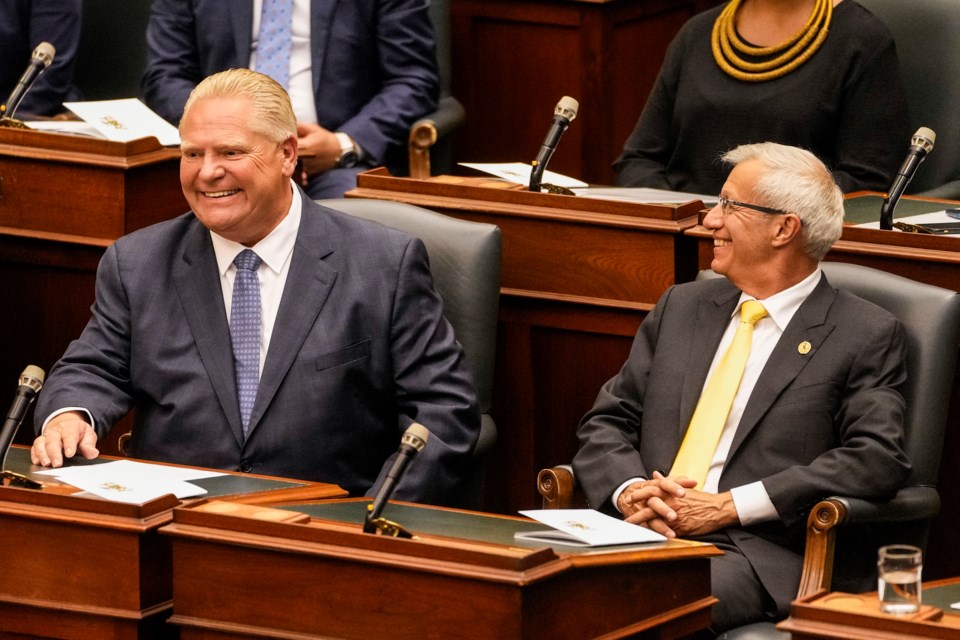EDITOR’S NOTE: This article originally appeared on The Trillium, a new Village Media website devoted exclusively to covering provincial politics at Queen’s Park
Europe’s biggest automaker will be building its first overseas electric-vehicle battery plant in Ontario, it announced on Monday.
German-based Volkswagen said in a news release that its battery company will build a gigafactory in St. Thomas where it plans to begin production in 2027.
The site where PowerCo, Volkswagen’s battery-maker, will build its Ontario gigafactory is the so-called “mega site” that the provincial government recently amalgamated in St. Thomas, according to a spokesperson for Economic Development, Job Creation and Trade Minister Victor Fedeli. Using Bill 63, titled the St. Thomas — Central Elgin Boundary Adjustment Act, the government carved hundreds of acres out of the latter municipality and combined it with St. Thomas.
Bill 63 sped through passage, with opposition parties opting not to vote against it. Central Elgin’s Mayor Andrew Sloan, however, said in a statement when it was introduced that the amount of land taken out of his municipality caught him “completely off guard.” Only when it was introduced on Feb. 22 did Sloan “(learn) for the first time that this bill was actually going to be 1,500 acres.
“Seventy-five per cent of this land is in Central Elgin,” he said.
Fedeli said during third reading debate of Bill 63 that “the window of opportunity to secure transformational EV sites is only open for a short time.”
“Right now, all around the world, everybody is jockeying for position to make sure they’re near critical minerals or to make sure they’re near a workforce, to make sure they can go into a low-cost jurisdiction, to make sure they can go into a jurisdiction that has an auto ecosystem,” Fedeli continued on Feb. 27. “All of those are in Ontario.”
Volkswagen’s announcement comes following months of regular meetings between their executives and Ford government officials, including at least four attended by Premier Doug Ford, according to Fedeli’s office.
Volkswagen’s commitment “is a major vote of confidence in Canada and Ontario, and in our shared work to position the country and the province as a global leader on the electric vehicle supply chain,” Fedeli and federal Innovation, Science and Industry Minister François-Philippe Champagne said in a joint news release on Monday.
Since 2020, Ontario has attracted over $17 billion worth of investments from global automakers, the news release says. Pre-COVID-19 — and this run of new investments by automakers — Ontario’s auto sector employed about 100,000 workers and contributed about 1.9 per cent to Ontario’s total GDP, the government’s website says.
In an interview in January 2023, Fedeli hinted that shoring up EV supply chains in Ontario was one of his immediate priorities while working to advance the Ford government’s automotive sector plan, Driving Prosperity.
Last August, the Government of Canada and Volkswagen signed a memorandum of understanding that agreed to focus “on deepening cooperation on sustainable battery manufacturing.”
Over the last year, Volkswagen has made several moves, including hiring a new chief designer and revamping its electrification plan, to position its scale-up of EV productions worldwide.
PowerCo is planning to produce sustainable unified cells at the gigafactory it’s building in St. Thomas, its news release said. Most of Volkswagen’s EVs will require these types of cells, which Volkswagen has previously said it plans to ramp up production of between now and 2030. Cells made at the planned St. Thomas plant will be used in its EVs made in North America, according to Volkswagen.
Coupled with Volkswagen’s recent announcement of its intention to build an EV factory in South Carolina, the company is “fast-forwarding the execution of (its) North American strategy,” Oliver Blume, its CEO, said in its news release.
Volkswagen intends to revive its Scout brand with a new EV pickup truck and SUV made in South Carolina starting in 2026. Once operational, the company plans to produce more than 200,000 vehicles at this site each year.
—With files from Aidan Chamandy.
